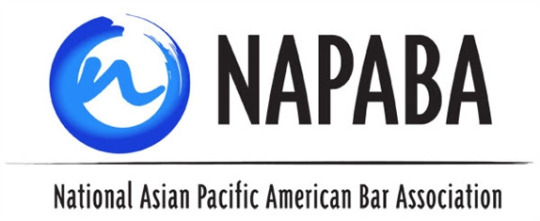
For Immediate Release
Oct. 8, 2015
For More Information, Contact:
Brett Schuster, Communications Manager
bschuster@napaba.org, 202-775-9555
Update: NAPABA Announces 2015 Daniel K. Inouye Trailblazer Award Recipients
WASHINGTON — The National Asian Pacific American Bar Association (NAPABA) has selected five exceptional attorneys to receive NAPABA’s highest honor — the Daniel K. Inouye Trailblazer Award. This award recognizes the outstanding achievements, commitment, and leadership of lawyers who have paved the way for the advancement of other Asian Pacific American (APA) attorneys. These Trailblazers have demonstrated vision, courage, and tenacity, and made substantial and lasting contributions to the APA legal profession, as well as to the broader APA community.
The 2015 Daniel K. Inouye Trailblazers Awards will be presented on Nov. 6, 2015, at a special ceremony during the 2015 NAPABA Convention in New Orleans, to the following recipients:
Captain Benes Z. Aldana — United States Coast Guard
Assemblymember Rob Bonta — California State Assembly
David Louie — Kobayashi Sugita & Goda LLP
Justice Sabrina Shizue McKenna — Supreme Court of the State of Hawai’i
Judge Amul Thapar — United States District Court, Eastern District of Kentucky
The 2015 Trailblazers class is represented by a diverse and impressive group. Captain Aldana serves as the Staff Judge Advocate (Chief Legal Officer) of the Eighth Coast Guard District, the largest district in the Coast Guard, and is responsible for providing legal advice to the district commander and oversees the provision of legal support to Coast Guard operations spanning 26 states, including the outer continental shelf of the Gulf of Mexico. Additionally, he is currently a judge on the U.S. Coast Guard Court of Criminal Appeals. He is believed to be the first Asian Pacific American to be appointed as a military trial judge (2005) and as an appellate judge (2015) in the U.S. military. As a leader in the American Bar Association, he is currently a board member of the ABA Rule of Law Initiative and on the ABA Commission on Diversity and Inclusion 360.
Assemblymember Bonta is the first and only Filipino American ever elected to the California State Legislature in the 165 year history of the state and has led a number of significant legislative efforts to empower the APIA community, including: Assembly Bill (AB) 7 to establish a state day of recognition to honor Filipino American labor leader and California hero, Larry Itliong; AB 123 to require the state public school curriculum to include the contributions of Filipino Americans to the farm labor movement in California; and AB 817 to assist the nearly 2.6 million eligible voters in California who are not yet fully proficient in English by providing them with language assistance at the polls.
Mr. Louie most recently served as the attorney general of the State of Hawai‘i from 2011 to 2014 — the first Chinese-American attorney general in the nation. As attorney general, Mr. Louie was the chief law enforcement officer for the state, providing advice, counsel, and representation to all aspects of state government (including the Governor) on all legal matters for the state, both civil and criminal. Mr. Louie helped to pass and defend Hawai’i legislation legalizing same sex marriage, settled 30-year-old claims of Native Hawai’ians against the State for $200 million, negotiated a $40 million conservation easement on 665 acres of ocean front land, and worked with other state attorneys general on the national mortgage foreclosure settlement, Internet safety and consumer protection.
Justice McKenna was a trial judge for 17 years before joining the Hawai’i Supreme Court in 2011 as its third woman and as the first open member of the LGBT community of Asian Pacific heritage to serve on a state court of last resort. Throughout her career, she has pursued civil rights, social justice, and equality in access to justice for all. As a young associate in the early 1980’s, she successfully advocated for her firm to provide 50 hours of annual billable hour credit for pro bono time, a policy that was also later adopted by other Hawai’i firms. Justice McKenna oversaw implementation of Hawai’i’s court interpreter certification program, instituted a policy requiring free language access for all participants in Oahu’s family courts as the then presiding judge, then advocated for adoption of the same policy for the entire judiciary. As an appellate and trial judge over the last 22 years, she has ruled in many high profile and important cases.
Judge Thapar was nominated by President George W. Bush to the U.S. District Court for the Eastern District of Kentucky and unanimously confirmed by the U.S. Senate in 2007, making him the nation’s first South Asian American Article III judge. Prior to his confirmation, Judge Thapar served as the U.S. attorney for the Eastern District of Kentucky. While U.S. attorney, Judge Thapar was appointed to the Attorney General’s Advisory Committee (AGAC) and chaired the AGAC’s Controlled Substances and Asset Forfeiture subcommittee.
NAPABA congratulates the 2015 Daniel K. Inouye Trailblazer Award recipients and thanks them for paving the way for Asian Pacific American attorneys.
_______________________________________________________________________
The National Asian Pacific American Bar Association (NAPABA) is the national association of Asian Pacific American attorneys, judges, law professors, and law students. NAPABA represents the interests of over 50,000 attorneys and approximately 75 national, state, and local Asian Pacific American bar associations. Its members include solo practitioners, large firm lawyers, corporate counsel, legal services and non-profit attorneys, and lawyers serving at all levels of government.
NAPABA continues to be a leader in addressing civil rights issues confronting Asian Pacific American communities. Through its national network of committees and affiliates, NAPABA provides a strong voice for increased diversity of the federal and state judiciaries, advocates for equal opportunity in the workplace, works to eliminate hate crimes and anti-immigrant sentiment, and promotes the professional development of people of color in the legal profession.
To learn more about NAPABA, visit www.napaba.org, like us on Facebook, and follow us on Twitter (@NAPABA).

